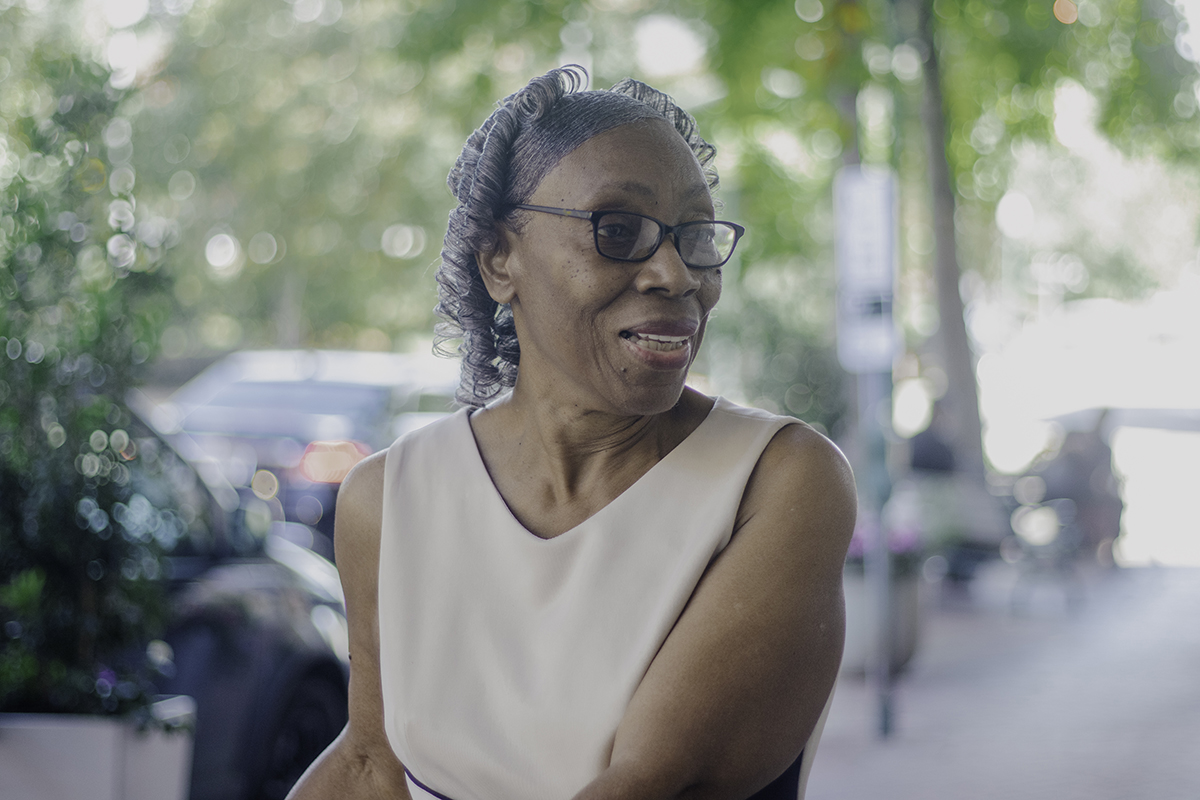By Paris Braggs, Caitlyn Russell, Jeremy Thomas and La’Ziyah Walker
Octavia Clayborne, a spirited woman in her 70s, stood in line on Election Day 2024 at New Hope Baptist Church with a bright smile on her face despite the scorching summer heat. Her silver hair, neatly curled in ringlets, shimmered under the relentless sun.
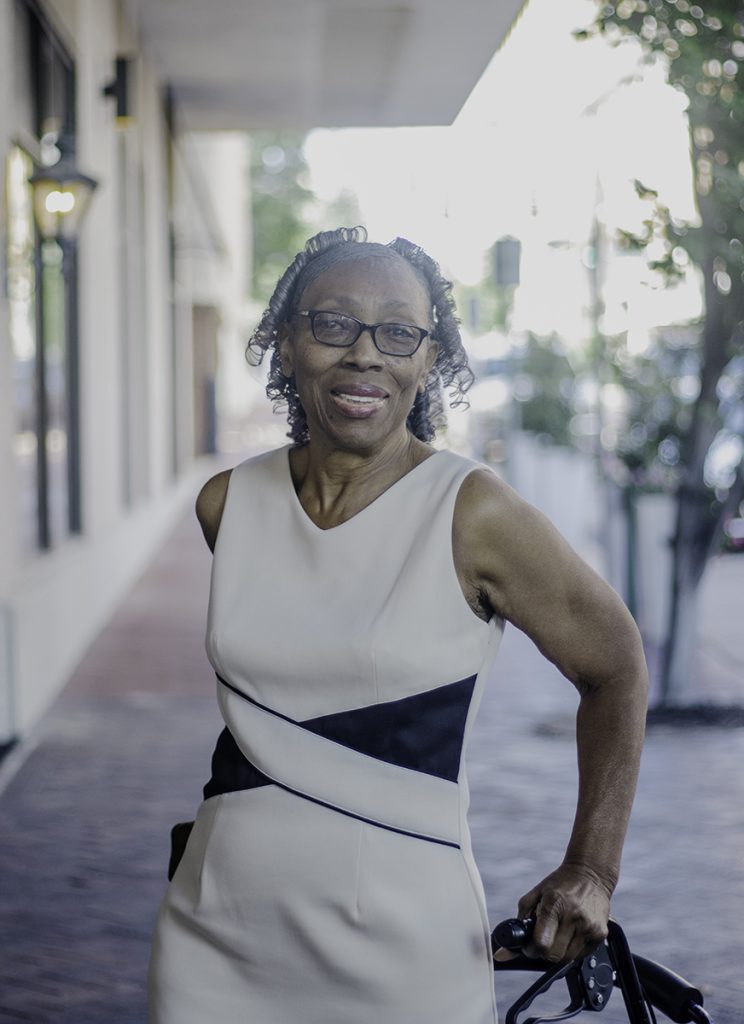
The voting line snaked around the block, the crowd full of the community’s diverse faces. Clayborne chatted with her neighbors, sharing stories of past elections and the importance of their civic duty. Her laughter was infectious and her optimism palpable. She noticed the impatience of the younger voters around her. They fidgeted with their phones, sighed loudly and shifted from one foot to another. Some even left, frustrated by the slow-moving line and the news that the polling place had run out of ballots.
Clayborne’s heart sank a little more each time a young person walked away. She understood their frustration but wished they could see the bigger picture. She remembered a time when voting wasn’t as accessible for people who looked like her, and she wasn’t going to let a long wait deter her from exercising her God-given right.
As hours passed and the sun dipped lower in the sky, the older voters remained steadfast. They formed a resilient group, leaning on canes, sitting on portable chairs they had the foresight to bring and sharing water and snacks. Clayborne led the conversation, encouraging everyone to stay positive. She shared anecdotes of how perseverance had led to change in the past, her voice a steady beacon of hope.
“Remember, we’ve faced tougher times than this,” the neighborhood elder said, her eyes twinkling. “We’re here because it matters. Every vote matters.”
Finally, as night set in, a new batch of ballots arrived. A roar of cheers went up from the crowd, a testament to their patience and determination. Clayborne stepped into the polling place, her heart swelling with pride and gratitude. She cast her vote with a sense of accomplishment, knowing that she had done her part in bettering Mississippi.
As she left the polling place, Clayborne glanced back at the dwindling line. She hoped her resilience had inspired at least a few of the younger ones to stay next time. Driving home under the soft glow of the street lights, Clayborne felt a profound sense of fulfillment. She had faced the challenges that came with voting head-on and had seen it through to the end, feeling a sense of unwavering commitment to her community and her country.
Clayborne’s relief at her voting success that day is due to the worldwide systemic issue of voter suppression, a tactic using rules, tricks and even unintentional disorganization to stop people—especially minorities—from voting. This can include but is not limited to voters needing special IDs, having few places to vote, getting the wrong information about poll locations and removing people from precinct lists. These tactics have a significant impact on the fundamental rights of everyone who does or does not vote and especially provides challenges to those within marginalized and underfunded communities.
Redlining: A Foundation for Systemic Oppression
Historical practices like redlining, the systematic denial of loans and other financial services to residents of predominantly Black neighborhoods, have intentionally segregated neighborhoods along racial lines as recently as 2016 in nearby Memphis, Tenn. The denial of the ability to grow wealth, through property values and home ownership, have led to long-lasting systemic economic and social disadvantages that, in turn, weaken voter enthusiasm.
Historically redlined communities often face voter disenfranchisement, which includes barriers to voting like reduced polling places as majority-Black parts of Mississippi still often face. That includes poorer voting conditions, longer lines at the polls and even fewer places to park when trying to vote. Or, not enough ballots.
It can go even deeper. “One concern of redlining is that politicians often discourage minorities from voting as district lines are drawn so that they are under-represented,” the University of Connecticut’s student newspaper reported in 2022. The Daily Campus warned that politicians engage in “packing” and “cracking” in order to limit impact from certain people voting.
“‘Packing’ is when map drawers place all ‘undesirable’ voters in a category so that they only count for one district,” the paper continued. “Specifically, this means placing all voters that will not vote for the politician drawing the maps in one area. ‘Cracking’ is when few undesirable voters are scattered in districts where they are the minority so that their vote doesn’t count as much. These strategies for redistribution arguably cause lower voter turnout.”
Race is inextricable from the CRA’s history, purpose, and the “ongoing systemic inequity in credit access for minority individuals and communities.” However, historically, the CRA has primarily used “low-income” as a proxy to identify communities and persons of color. Disparities in mortgage lending to people of color, as illustrated above, show the need for the CRA to include race in the metrics. Neither geography nor income are sufficient proxies for race, especially in places like the Deep South with a substantial portion of low-income areas.
Redlining harks back to the days after the Civil War when white leaders found many ways to discourage newly emancipated Black Americans from voting and keep them from building wealth and thus electoral power in the future. Dr. Wilma Mosley Clopton, founder of NMHS Unlimited Film Productions, explains that “the areas that were historically plantations are the same areas where finding access to finance is limited or prohibited.” This created a stark racial divide, with white families able to use government-subsidized mortgages to purchase homes and build intergenerational equity, while Black families were denied that same pathway to financial security.
As Hope Policy Institute analysts explained in the Mississippi Free Press in 2021: “The U.S. government agency, Home Owners Loan Corporation introduced redlining in 1935, when it drew literal red lines on maps to delineate the perceived riskiness of making mortgage loans, and in fact directed lenders to ‘refuse to make loans in these areas [or] only on a conservative basis.’”
In Jackson, Miss., the HOLC designated different parts of the city as “hot spots” (good for big loans) and others as having “detrimental influences” and “undesirable populations” where loans weren’t recommended or “only on a conservative base.
Those loan refusals ensured that Black families would struggle for generations in contrast to white families whose ability to use home equity to build and pass on wealth to their children created a different trajectory. This helped keep poverty entrenched—conditions that both make it easy to institute voter suppression even as people living in poverty do not have time, transportation or childcare to go vote—or the belief that it will make a difference in their lives.
The practices were not limited to the South; by the early 20th century, redlining was a strategy across the nation, and employed by the federal government, to effectively cut off opportunities for homeownership and wealth-building for generations of African Americans.
The effects of such systemic racism are still evident. In Mississippi, for example, Black homeownership rates are at their lowest point in 14 years, despite the passage of laws like the Community Reinvestment Act aimed at addressing redlining’s impact. Furthermore, even high-income Black households in the state face significantly higher mortgage denial rates than their white counterparts. The Hope Policy Institute reports that the mortgage denial rate for black borrowers in the Deep South earning more than $150,000 was higher than for white borrowers earning $30,000 to $50,000 in 2021.
Consequences for Political Participation
This lack of homeownership and generational wealth has downstream consequences for political participation. Princeton University researchers found a strong correlation between homeownership, community investment and voter turnout. When residents lack a sense of long-term shareholding in their neighborhoods, they are less likely to engage in the political process.
The Hope Policy Institute experts discussed in the Mississippi Free Press how the foreclosure crisis also has a disproportionate impact on communities of color, with 30% of loans to Black households in Mississippi ending in foreclosure, compared to just 12% for white households. This further eroded the financial security and community ties that undergird civic engagement.
MFP reporter Nick Judin reported that the water crisis in Jackson, Miss. is another manifestation of systemic racism through decades of neglect and disinvestment in majority-Black neighborhoods. Residents, already dealing with the burden of securing clean water, have fewer resources to devote to political organizing and turnout.

Blueprint Polling found that Jackson residents generally gave low marks to both Democratic Mayor Chokwe Antar Lumumba and Republican Gov. Tate Reeves for their handling of the water crisis. The poll showed that 34.8% of respondents found Reeves’ handling of the crisis “totally unacceptable,” while 31.3% found Lumumba’s efforts “totally unacceptable.” This dissatisfaction with the political leaders’ response to the crisis could make residents less likely to vote, as they may feel that their concerns are not being suitably addressed.
Experts like Clopton and the Hope Policy Institute warn that addressing the legacy of redlining and its ongoing effects will be crucial to strengthening democracy and ensuring equal access to the ballot box. Policies that promote equitable homeownership, investment in communities of color, and the remediation of environmental injustices can all play a role in empowering marginalized groups and reinvigorating civic participation.
Voting Rights Gone Forever for Some Convicted of Felonies
In 1984, Stephen Riggs was incarcerated after being caught with illegal substances in Jackson, Miss., sentenced to 20 years in prison. When he was released in 2004, he changed his life, but one thing remained gone forever—his right to vote. Since his release, he has become a pastor, started an outreach ministry and is also tutoring incarcerated teens and adults.
But he still can’t vote.
“When trying to get your rights back, they look at your reading comprehension skills,” Riggs said. Despite this, significant barriers remain for Mississippians convicted of certain felonies in trying to exercise their right to vote.
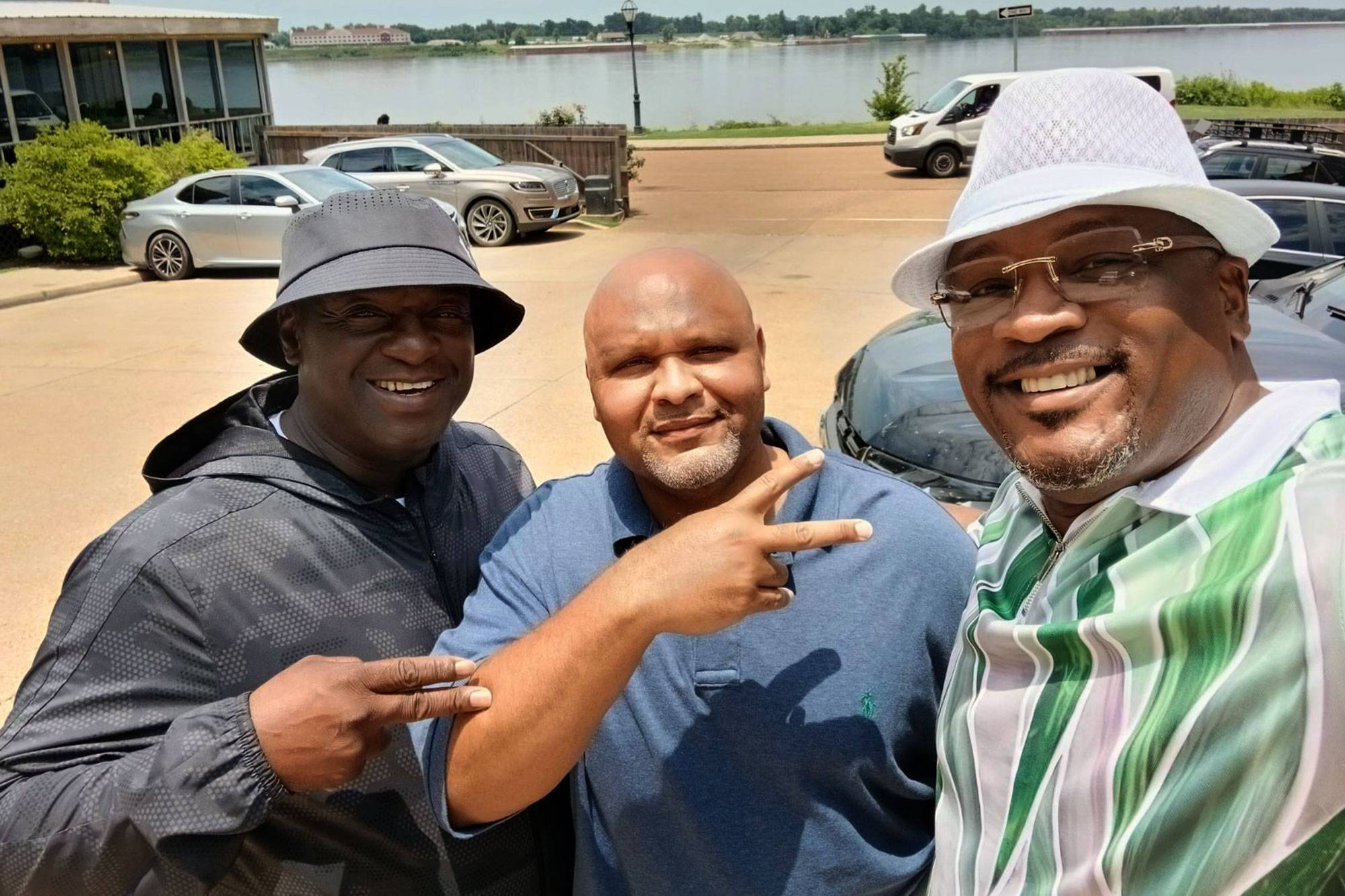
Disenfranchisement—being deprived of the right to vote—has occurred for decades in the Black community. Despite the “Civil War amendments” that granted Black citizens the right to vote, the end of Reconstruction opened the door to roll back those rights, including through state efforts to pick certain crimes then believed to be committed by Black people that, if convicted, mean they would love the right to vote forever even after serving their time.
MFP News Editor Ashton Pittman reported in 2022 on Mississippi’s racist disenfranchisement law that southern courts routinely uphold. “The 1890 provision at issue is Section 241 of the Mississippi Constitution, which originally permanently disenfranchised people who committed the following crimes: bribery, burglary theft, arson, obtaining money or goods under false pretense, perjury, forgery, embezzlement and bigamy,” Pittman wrote. “In their effort to only include crimes they believed Black people were most likely to commit, the white-supremacist drafters of the 1890 Constitution did not originally include murder and rape as disenfranchising crimes. … Later, in 1968, he added, the state held a voter referendum with language to include “the ‘non-black’ crimes of ‘murder’ and ‘rape’ to the disenfranchising crimes in Section 241.”
In addition, the 1890 Mississippi Constitution ushered in an era of Jim Crow laws that blocked Black people from exercising the full right to vote until the 1965 passage of the Voting Rights Act, which stopped racist practices like poll taxes, the “grandfather” clause and literacy tests.
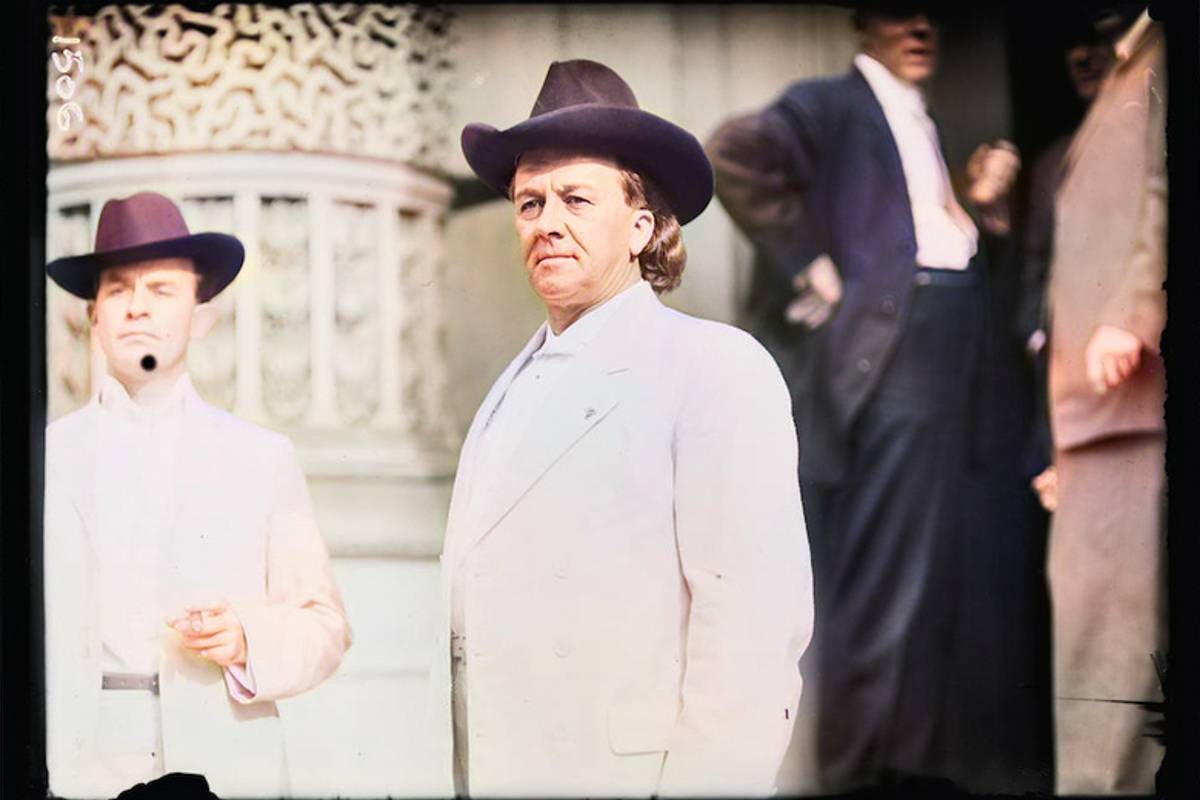
Felony disenfranchisement is one of the most common ways for people to have their voting rights taken from them, as 2024 YMP student Kaitlyn Poole wrote in this opinion piece. When a person is convicted of certain crimes, their rights will be removed forever unless a person undertakes the lengthy process of having their rights restored. To do this, they must file an application, attend a hearing and then wait for a confirmation that may not come. Mississippi is one of only two states that bans felons from voting permanently, regardless of the crime committed or of the time served. More than 40,000 people are disenfranchised in the state of Mississippi, the Clarion Ledger reported.
In Mississippi, certain crimes that disqualify individuals from voting have been criticized as selective and racially biased. Experts argue that these disenfranchisement laws disproportionately affect African American communities. Recently, the 5th U.S. Circuit Court of Appeals upheld the law. “These laws are a relic of Jim Crow, designed to suppress the Black vote,” Professor Carol Anderson, a historian and expert on voting rights, said. The court’s decision to uphold these laws has sparked significant controversy and debate about the ongoing impact of racial discrimination in the electoral process.
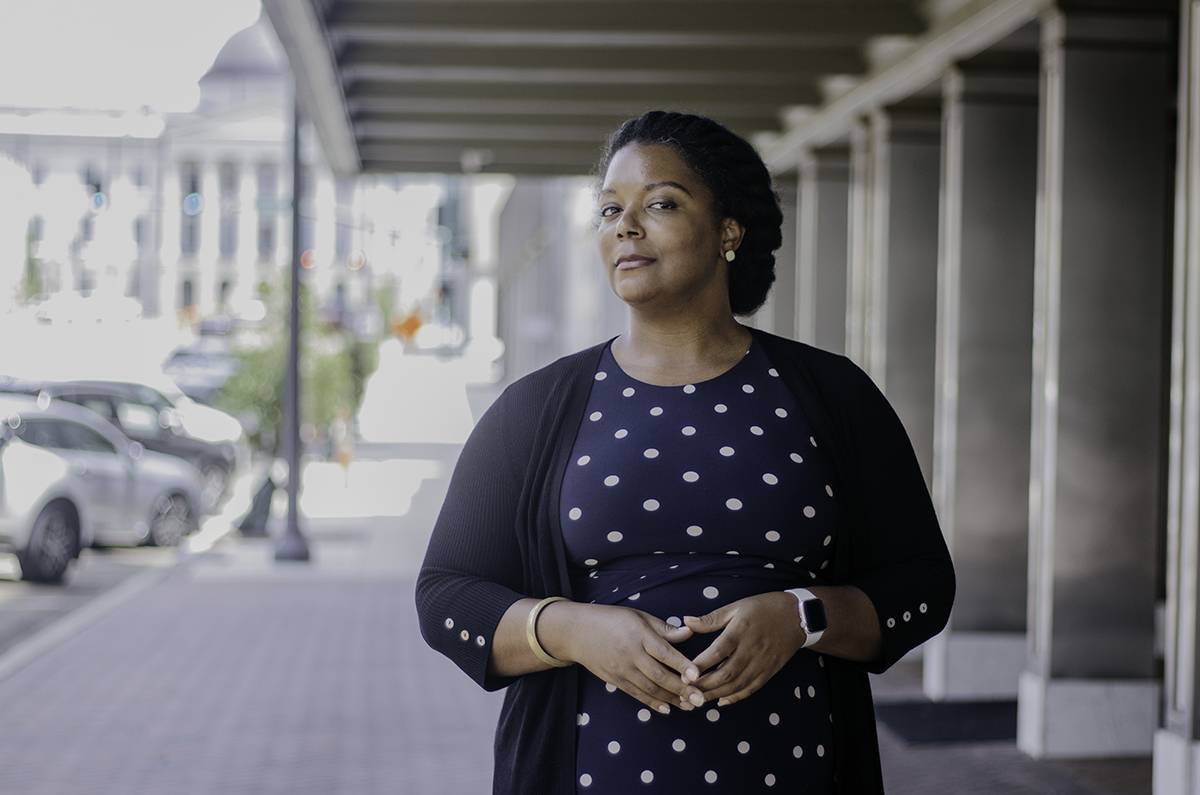
These barriers are historically placed more on the Black community. “We have been disenfranchised for years; it’s a big injustice not only to me but the pioneers as well,” convicted felon Joseph Holiday told the Youth Media Project. Statistics show that more than 230,000 Mississippians continue to be denied the right to vote, despite having completed their sentences.
“You should be back as a naturalized citizen, you should have every right that every citizen has because you paid your debt,” U.S. and AP history teacher Ashley Young, who teaches at Ridgeland High School, said of this widespread disenfranchisement.
Keeping It Harder to Vote Absentee
Stringent laws surrounding absentee voting can also keep Mississippians from casting their vote—or at least make it harder. The absentee voting process in Mississippi involves an 11-step explanation as the Secretary of State website on absentee-voting information details.
For instance, absentee voting in Mississippi allows voters to cast their ballots by mail or in-person ahead of time if they meet certain criteria. These include individuals who are away from their county or residence on Election Day, those who are 65 years of age or older, or anyone with a temporary or permanent physical disability that prevents them from voting in person.
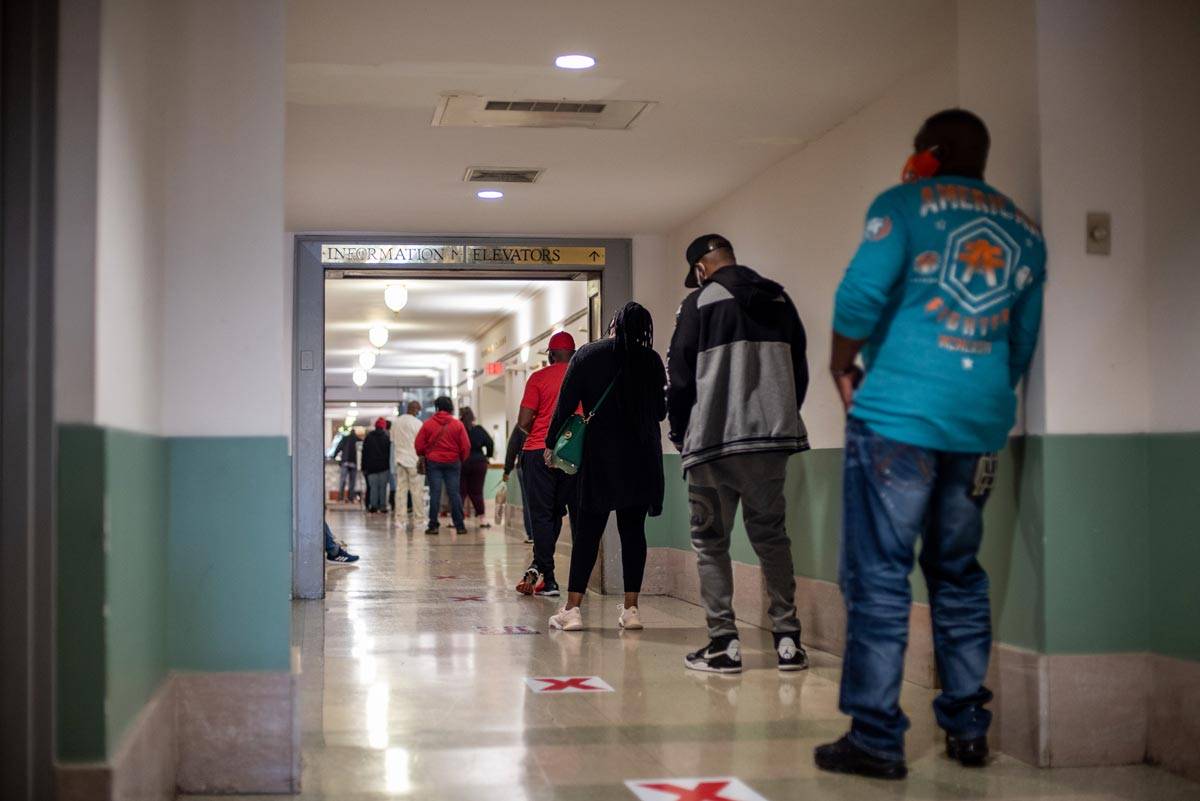
Additionally, members of the armed forces and their families, as well as any students and teachers living outside their home country, are eligible. However, the restrictive nature of these criteria means many Mississippians may not take advantage of absentee voting.
For example, people who have work or caregiving responsibilities but do not fall under the specified categories may find it challenging to vote in person on Election Day, yet they do not qualify for absentee voting.
Moreover, Mississippi’s voting regulations do not include provisions for same-day or automatic registration, processes that could significantly increase voter participation. Automatic registration, where eligible individuals are registered to vote when interacting with certain government agencies such as the DMV, can increase voter turnout by simplifying the registration process.
The lack of these provisions places an additional burden on voters, who must ensure they are registered way in advance of Election Day.
Mississippi: A Lack of Youth Involvement
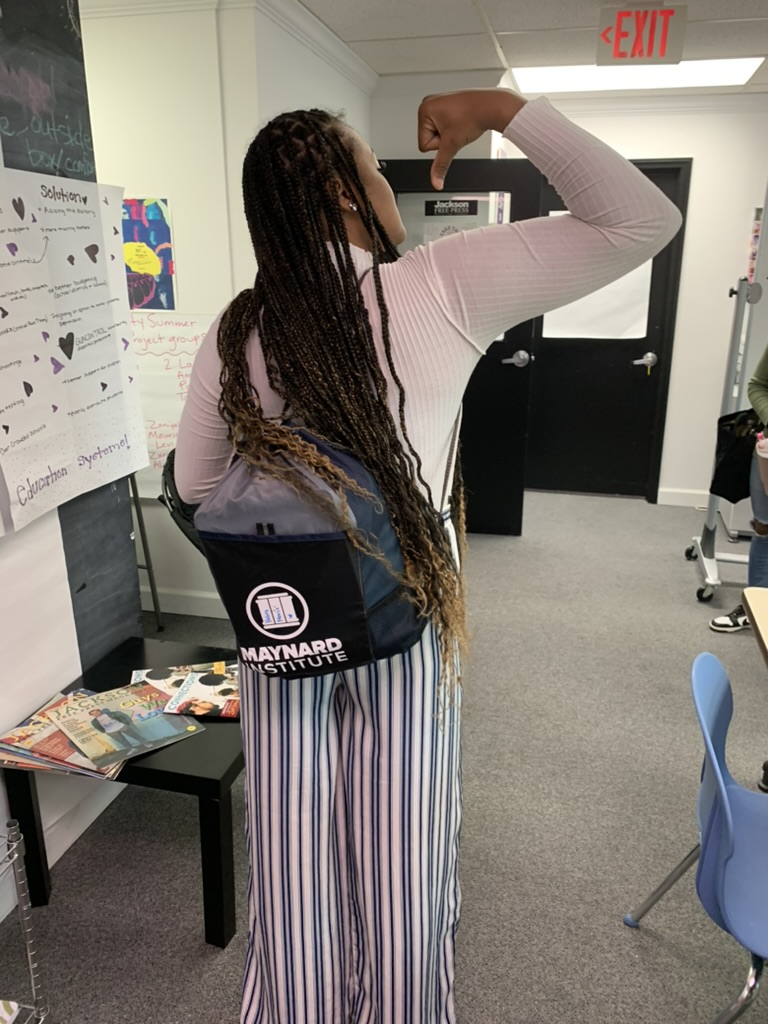
These oppressive systemic tactics to embed equality and lack of equitable resources are especially harmful to young people, who already feel a sense of disconnection from the political process. They grow up in communities with fewer services and, often, homes and property decaying due to the lack of access to resources for repairs, which adds to the cycle of low home values. Young people then may leave their neighborhoods rather than investing in them, prolonging the cycle for those still there.
Engaging young people plays a crucial role in fostering a representative democracy, but these systemic challenges hinder their participation and further diminish their voices.
A common saying when it comes to state rankings is “thank God for Mississippi,” as the Magnolia State is usually low in state rankings. The same holds true for voting. Mississippi had the lowest voter turnout in recent elections, with only 32% of the state “voting in the 2022 elections.
In the 2020 presidential election, Mississippi ranked 41st out of 50 states in voter turnout, and the so-called hospitality state is ranked second in most restrictive voting policies. A Center of Information and Research on Civic Learning & Engagement study found that states with a lack of registration and facilitative voting policies or states that have restrictive laws have lowered youth voter turnout.
Despite the state’s low voter turnout, programs such as Mississippi Votes have started to revive the youth voter population. Of this process, current Outreach coordinator and 2016 Youth Media Project alumnus Maisie Brown said young voter education is imperative.
“(We need to) really explain to them that voting is one of the most powerful tools that you can use to voice your opinion and to make a direct change in what’s going on,” she told the Youth Media Project in a newsroom interview. “ If you look at who makes the laws, if you look at how things are passed, if you look at how processes are created—most of those things are created by folks who are voted into office.”
That is, voting matters. A lot.

